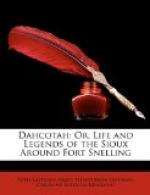The woman believed them all; for, like a good wife, she shone by the reflected light of her husband’s fame.
When they returned home, she made her fire and put the fish to cook, and towards evening many of the Indians were assembled in the wigwam of the war-chief, and partook of the fish he had caught in the morning.
“Unk-ta-he,” [Footnote: The God of the Waters] said one of the oldest men in the tribe (and reverenced as a medicine man of extraordinary powers), “Unk-ta-he is as powerful as the thunder-bird. Each wants to be the greatest god of the Dahcotahs, and they have had many battles. My father was a great medicine man; he was killed many years ago, and his spirit wandered about the earth. The Thunder-bird wanted him, and Unk-ta-he wanted him, for they said he would make a wonderful medicine man. Some of the sons of Unk-ta-he fought against the sons of the Thunder, and the young thunder-birds were killed, and then Unk-ta-he took the spirit of my father, to teach him many mysterious things.
“When my father had lived a long time with Unk-ta-he in the waters under the earth, he took the form of a Dahcotah again, and lived in this village. He taught me all that I know, and when I go to the land of spirits, my son must dance alone all night, and he will learn from me the secret of the medicine of our clan.”
All listened attentively to the old man, for not an Indian there but believed that he could by a spell cause their instant death; and many wonderful miracles had the “Elk” wrought in his day.
In the corner of the wigwam sat the Bound Spirit, whose vacant look told the sad tale of her want of reason. Generally she sat quiet, but if the cry of an infant fell upon her ear, she would start, and her shriek could be heard throughout the village.
The Bound Spirit was a Sisseton. In the depth of winter, she had left her village to seek her friends in some of the neighboring bands. She was a widow, and there was no one to provide her food.
Accompanied by several other Indians, she left her home, which was made wretched by her desolate condition—that home where she had been very happy while her husband lived. It had since been the scene of her want and misery.
The small portion of food they had taken for their journey was exhausted. Rejoiced would they have been to have had the bark of trees for food; but they were on the open prairie. There was nothing to satisfy the wretched cravings of hunger, and her child—the very child that clung to her bosom—was killed by the unhappy mother, and its tender limbs supplied to her the means of life.
She reached the place of destination, but it was through instinct, for forgetting and forgotten by all was the wretched maniac who entered her native village.
The Indians feared her; they longed to kill her, but were afraid to do so. They said she had no heart.
Sometimes she would go in the morning to the shore, and there, with only her head out of water, would she lie all day.




